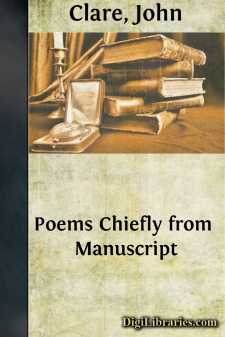Categories
- Antiques & Collectibles 13
- Architecture 36
- Art 48
- Bibles 22
- Biography & Autobiography 813
- Body, Mind & Spirit 142
- Business & Economics 28
- Children's Books 17
- Children's Fiction 14
- Computers 4
- Cooking 94
- Crafts & Hobbies 4
- Drama 346
- Education 46
- Family & Relationships 57
- Fiction 11829
- Games 19
- Gardening 17
- Health & Fitness 34
- History 1377
- House & Home 1
- Humor 147
- Juvenile Fiction 1873
- Juvenile Nonfiction 202
- Language Arts & Disciplines 88
- Law 16
- Literary Collections 686
- Literary Criticism 179
- Mathematics 13
- Medical 41
- Music 40
- Nature 179
- Non-Classifiable 1768
- Performing Arts 7
- Periodicals 1453
- Philosophy 64
- Photography 2
- Poetry 896
- Political Science 203
- Psychology 42
- Reference 154
- Religion 513
- Science 126
- Self-Help 84
- Social Science 81
- Sports & Recreation 34
- Study Aids 3
- Technology & Engineering 59
- Transportation 23
- Travel 463
- True Crime 29
Sort by:
by:
John Clare
BIOGRAPHICAL The life of John Clare, offering as it does so much opportunity for sensational contrast and unbridled distortion, became at one time (like the tragedy of Chatterton) a favourite with the quillmen. Even his serious biographers have made excessive use of light and darkness, poetry and poverty, genius and stupidity: that there should be some uncertainty about dates and incidents is no great...
more...
by:
Aesop
THE MOUSE & THE LIONA poor thing the Mouse was, and yet,When the Lion got caught in a net,All his strength was no use’Twas the poor little MouseWho nibbled him out of the net. SMALL CAUSES MAY PRODUCE GREAT RESULTSSo the Mouse had Miss Lion for bride;Very great was his joy and his pride:But it chanced that she putOn her husband her foot,And the weight was too much, so he died. ONE MAY BE TOO...
more...
One Night fell. The red waters of the swamp grew sinister and sullen. The tall pines lost their slimness and stood in wide blurred blotches all across the way, and a great shadowy bird arose, wheeled and melted, murmuring, into the black-green sky. The boy wearily dropped his heavy bundle and stood still, listening as the voice of crickets split the shadows and made the silence audible. A tear wandered...
more...
Had the Wilmot Electric Light people remained content only to make light, had they not, as a by-product, attempted to make money, they need not have left Hayti. When they flooded with radiance the unpaved streets of Port-au-Prince no one, except the police, who complained that the lights kept them awake, made objection; but when for this illumination the Wilmot Company demanded payment, every one up to...
more...
INTRODUCTION (Voyages of Discovery and Early Explorations.) Schoolboys have been taught from their earliest years that Columbus discovered America. Few events in prehistoric times seem more probable now than that Columbus was not the first to discover it. The importance of his achievement over that of others lay in his own faith in his success, in his definiteness of purpose, and in the fact that he...
more...
Cutter the First. Reader, have you ever been at Plymouth? If you have, your eye must have dwelt with ecstasy upon the beautiful property of the Earl of Mount Edgcumbe: if you have not been at Plymouth, the sooner that you go there the better. At Mount Edgcumbe you will behold the finest timber in existence, towering up to the summits of the hills, and feathering down to the shingle on the beach. And...
more...
The Author’s Preface to the Reader. Instruction is the means to expel Rudeness, with which young wits ought to be well furnished in Schools: But so, as that the teaching be 1. True, 2. Full, 3. Clear, and 4. Solid. 1. It will be true, if nothing be taught but such as is beneficial to ones life; lest there be a cause of complaining afterwards. We know not necessary things, because we have not...
more...
ITALIAN WARS.—PARTITION OF NAPLES.—GONSALVO OVERRUNS CALABRIA. 1498-1502. Louis XII.'s Designs on Italy.—Alarm of the Spanish Court.—Bold Conduct of its Minister at Rome.—Celebrated Partition of Naples.—Gonsalvo Sails against the Turks.—Success and Cruelties of the French.—Gonsalvo Invades Calabria.—He Punishes a Mutiny.—His Munificent Spirit.—He Captures Tarento.—Seizes...
more...
CHAPTER I. A FRONTIER FARM. "Concord, March 1, 1774. "MY DEAR COUSIN: I am leaving next week with my husband for England, where we intend to pass some time visiting his friends. John and I have determined to accept the invitation you gave us last summer for Harold to come and spend a few months with you. His father thinks that a great future will, ere many years, open in the West, and that it...
more...
by:
Edwin Arnold
Book The First The Scripture of the Saviour of the World,Lord Buddha—Prince Siddartha styled on earthIn Earth and Heavens and Hells Incomparable,All-honoured, Wisest, Best, most Pitiful;The Teacher of Nirvana and the Law. Then came he to be born again for men. Below the highest sphere four Regents sitWho rule our world, and under them are zonesNearer, but high, where saintliest spirits deadWait...
more...











